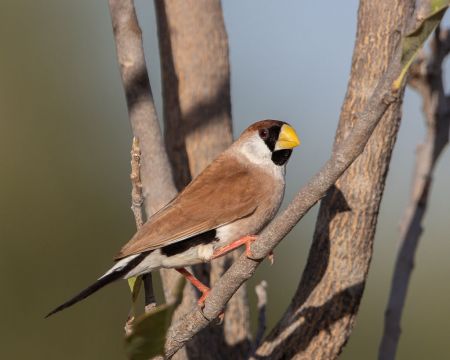m (→External Links: removed BFTV link) |
|||
| (6 intermediate revisions by 5 users not shown) | |||
| Line 1: | Line 1: | ||
| − | + | [[Image:Finch, Masked 01e Poephila personata personata AUSTRALIA.jpg|thumb|450px|right|''ssp personata'' <br/ >Photo © by {{user|peterday|peterday}}<br/>Holmes Jungle, Darwin, [[Queensland]], June 2015]] | |
| − | [[Image: | + | [[Image:1991 Finch, Masked 02b.jpg|thumb|450px|right|''ssp leucotis'' <br/ >Photo © by {{user|peterday|peterday}}<br/>Cumberland Dam, Georgetown, [[Queensland]], July 2021]] |
| + | ;[[:Category:Poephila|Poephila]] personata | ||
==Identification== | ==Identification== | ||
| − | Adult | + | 12-13.5cm (4½ - 5½ in) |
| − | + | ====Adult==== | |
| + | *Heavy yellow bill | ||
| + | *Black mask, chin, tail, band on flanks | ||
| + | *Buff breast | ||
| + | *White rump | ||
| + | *Red legs | ||
| + | *Subspecies ''personata'' has buff ear coverts and lower flanks | ||
| + | *Subspecies ''leucotis'' has white ear coverts and lower flanks | ||
| + | ====Immature==== | ||
| + | *Black bill | ||
| + | *Duller | ||
==Distribution== | ==Distribution== | ||
| − | [[Australia]] | + | Northern [[Australia]] from Cape York to Kimberley, WA |
==Taxonomy== | ==Taxonomy== | ||
| + | ====Variations==== | ||
| + | There are 2 subspecies<sup>[[#References|[1]]]</sup> | ||
| + | *''P.p.personata'' is found in Northern Territory west to Kimberley, Western Australia | ||
| + | *''P.p.leucotis'' is found in Cape York and eastern NT | ||
==Habitat== | ==Habitat== | ||
| − | + | Grassy woodland close to water | |
==Behaviour== | ==Behaviour== | ||
| + | *Forages on ground in small flocks | ||
| + | *Flicks tail frequently | ||
| + | *Gathers at water in morning and evening, sometimes in large numbers | ||
| + | ====Diet==== | ||
Diet includes fallen grass seeds. | Diet includes fallen grass seeds. | ||
| − | + | ====Breeding==== | |
A domed nest is built from grasses, lined with fine grass, feathers, and charcoal, in the late wet season or early dry. 5-6 white eggs are laid. | A domed nest is built from grasses, lined with fine grass, feathers, and charcoal, in the late wet season or early dry. 5-6 white eggs are laid. | ||
| + | ====Vocalisation==== | ||
| + | Long nasal 'tiat', soft 'tet'. | ||
| + | ==External Links== | ||
| + | {{GSearch|"Poephila personata" {{!}} "Masked Finch"}} | ||
| + | {{GS-checked}}1 | ||
| + | <br /> | ||
| + | <br /> | ||
| − | + | [[Category:Birds]][[Category:Taeniopygia]] | |
| − | |||
| − | |||
| − | [[Category:Birds]][[ | ||
Latest revision as of 18:59, 31 May 2023
- Poephila personata
Identification
12-13.5cm (4½ - 5½ in)
Adult
- Heavy yellow bill
- Black mask, chin, tail, band on flanks
- Buff breast
- White rump
- Red legs
- Subspecies personata has buff ear coverts and lower flanks
- Subspecies leucotis has white ear coverts and lower flanks
Immature
- Black bill
- Duller
Distribution
Northern Australia from Cape York to Kimberley, WA
Taxonomy
Variations
There are 2 subspecies[1]
- P.p.personata is found in Northern Territory west to Kimberley, Western Australia
- P.p.leucotis is found in Cape York and eastern NT
Habitat
Grassy woodland close to water
Behaviour
- Forages on ground in small flocks
- Flicks tail frequently
- Gathers at water in morning and evening, sometimes in large numbers
Diet
Diet includes fallen grass seeds.
Breeding
A domed nest is built from grasses, lined with fine grass, feathers, and charcoal, in the late wet season or early dry. 5-6 white eggs are laid.
Vocalisation
Long nasal 'tiat', soft 'tet'.
External Links
GSearch checked for 2020 platform.1





